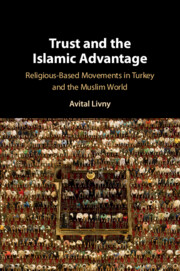Book contents
- Frontmatter
- Dedication
- Contents
- List of Figures
- List of Tables
- Acknowledgments
- 1 Introduction
- Part I Theoretical Development
- 2 Understanding the Rise of Islamic-Based Movements in the Muslim World
- 3 Evaluating Existing Theories of the Islamic Advantage
- 4 Generalized Distrust and the Participation Gap in the Muslim World
- 5 Muslim Identity and Group-Based Trust
- Part II Applications and Empirics
- Part III Theoretical Development
- Appendix
- Bibliography
- Index
2 - Understanding the Rise of Islamic-Based Movements in the Muslim World
from Part I - Theoretical Development
Published online by Cambridge University Press: 31 August 2020
- Frontmatter
- Dedication
- Contents
- List of Figures
- List of Tables
- Acknowledgments
- 1 Introduction
- Part I Theoretical Development
- 2 Understanding the Rise of Islamic-Based Movements in the Muslim World
- 3 Evaluating Existing Theories of the Islamic Advantage
- 4 Generalized Distrust and the Participation Gap in the Muslim World
- 5 Muslim Identity and Group-Based Trust
- Part II Applications and Empirics
- Part III Theoretical Development
- Appendix
- Bibliography
- Index
Summary
The success of Islamic-based political and economic movements is contrasted with lowerrates of political and economic activity in Muslim countries. The latter -- a significant “participation gap“ -- holds even after accounting for differences at the national-level and, within countries, across individuals. Based on these two trends, the argument is made that Islamic-based movements enjoy a comparative advantage when it comes to mobilizing individuals to participate in collective political and economic activities. This helps to clarify two key research questions: What are the obstacles to political and economic participation among individuals in the Muslim world? And how do references to Islam help to address these obstacles? Three existing explanations for the Islamic advantage are reviewed, each defined in terms of how it sees the obstacle to participation and the role of Islam in alleviating it. While grievance theory holds that Islam speaks to frustrations and resentments among the poor, the faith-based theory of transvaluation argues that religious beliefs create a sense of duty to serve God, regardless of the risks involved. A final theory suggests that individuals are better informed about what they canexpect from Islamic-based groups,.
- Type
- Chapter
- Information
- Trust and the Islamic AdvantageReligious-Based Movements in Turkey and the Muslim World, pp. 21 - 36Publisher: Cambridge University PressPrint publication year: 2020



